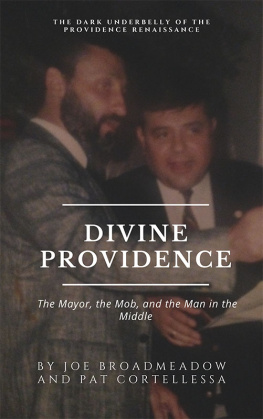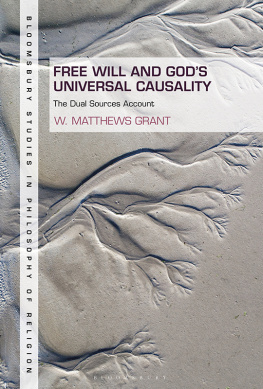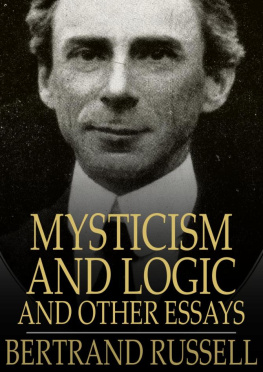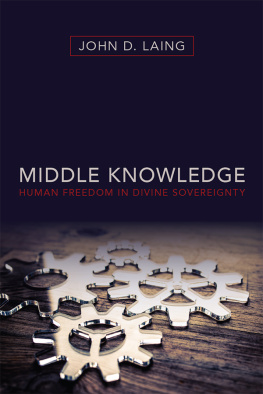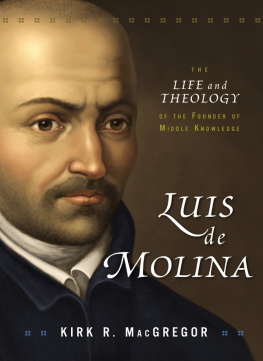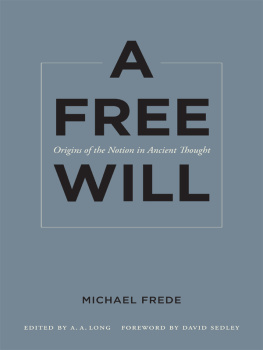Molinism:
The Contemporary Debate
Ken Perszyk
- Great Clarendon Street, Oxford OX2 6DP
- Oxford University Press is a department of the University of Oxford.
- It furthers the Universitys objective of excellence in research, scholarship,
- and education by publishing worldwide in
- AucklandCape TownDar es SalaamHong KongKarachi
- Kuala LumpurMadridMelbourneMexico CityNairobi
- New DelhiShanghaiTaipeiToronto
- ArgentinaAustriaBrazilChileCzech RepublicFranceGreece
- GuatemalaHungaryItalyJapanPolandPortugalSingapore
- South KoreaSwitzerlandThailandTurkeyUkraineVietnam
- Oxford is a registered trade mark of Oxford University Press
- in the UK and in certain other countries
- Published in the United States
- by Oxford University Press Inc., New York
- the several contributors 2011
- The moral rights of the authors have been asserted
- Database right Oxford University Press (maker)
- All rights reserved. No part of this publication may be reproduced,
- stored in a retrieval system, or transmitted, in any form or by any means,
- without the prior permission in writing of Oxford University Press,
- or as expressly permitted by law, or under terms agreed with the appropriate
- reprographics rights organization. Enquiries concerning reproduction
- outside the scope of the above should be sent to the Rights Department,
- Oxford University Press, at the address above
- You must not circulate this book in any other binding or cover
- and you must impose the same condition on any acquirer
- British Library Cataloguing in Publication Data
- Library of Congress Cataloging in Publication Data
- Typeset by SPI Publisher Services, Pondicherry, India
- Printed in Great Britain
- on acidfree paper by
- MPG Books Group, Bodmin and Kings Lynn
(p.vii) List of Contributors
WILLIAM LANE CRAIG is Research Professor of Philosophy at the Talbott School of Theology.
JOHN MARTIN FISCHER is Distinguished Professor and Chair, Department of Philosophy, at the University of California, Riverside.
THOMAS P. FLINT is Professor of Philosophy at the University of Notre Dame.
WILLIAM HASKER is Professor Emeritus of Philosophy at Huntington University.
EDWIN MARES is Professor of Philosophy at Victoria University of Wellington.
HUGH J. MCCANN is Professor of Philosophy at Texas A&M University.
TRENTON MERRICKS is Professor of Philosophy at the University of Virginia.
DERK PEREBOOM is Professor of Philosophy at Cornell University.
KEN PERSZYK is Senior Lecturer in Philosophy and Head of the School of History, Philosophy, Political Science & International Relations at Victoria University of Wellington.
GREG RESTALL is Associate Professor of Philosophy at the University of Melbourne.
EDWARD WIERENGA is Professor of Religion and of Philosophy and Chair, Department of Religion and Classics, at the University of Rochester.
DEAN ZIMMERMAN is Professor of Philosophy at Rutgers University.
Introduction
Ken Perszyk
Molinism is named after the sixteenthcentury Spanish Jesuit, theologian, and philosopher Luis de Molina (15351600). Molinism, minimally defined, is the thesis that God has middle knowledge (scientia media). God's knowledge of counterfactuals of freedom is called middleknowledge because it comes inbetween his socalled natural and free knowledgewhat other Catholic philosophical theologians, following Aquinas, called knowledge of simple intelligence and knowledge of vision. The truths God knows by natural knowledge are necessary and independent of his will. The truths God knows by free knowledge are contingent and dependent on his will. The truths God knows by middle knowledge are contingent but independent of his will.
There can be a fine line between saying too little and too much in an Introduction. This volume aspires to examine the current state of a longstanding debate over Molinismits status, defensibility, and applicationsand to suggest ways to advance it. Some readers will be newcomers to the debate. For you, I highly recommend, as background reading on Molinism, Craig ( Other readers will have some or even a great deal of familiarity with the Molinism Wars, past or present. Regardless of one's prior background, I think it is important to say something briefly at the outset, even at the risk of gross oversimplification, about the main, more general motivation (historical and contemporary) for endorsing the Molinist notion of middle knowledge. Otherwise, newcomers to the debate might well wonder what is really at stake herewhat's the rumoured fuss over Molinism all about? And even those readers already familiar with at least the main contours of the contemporary debate might lose sight of reasons in favor of Molinism.
Molinism arose out of the Catholic CounterReformation. While the Council of Trent's Canons on Justification (1547) unequivocally anathematized anyone who denied either God's initiative in our salvation or our freedom to consent to God's grace, they left unanswered several key questions regarding the nature of the relationship between God's (efficacious) graceand so predestinationand our freedom. Starting in the early 1580s, Molina and some of his fellow Jesuits became entangled in a fierce debate with the Dominican Domingo Baez (15281604) and others over these issues. What began as a punchup between two theology professors on the Iberian PeninsulaMolina may have been a slight, unimpressive figure of a man (Brodrick
(p.4) Despite their serious disagreements, these Catholic adversaries were united in a commitment to a strong, traditional account of divine providence that has been affirmed by many Christians throughout the centuries. This account entails the thesis, put roughly, that everything that happens is specifically intended, or else permitted, by God. God's providence is not restricted to having general strategies or contingency plans for the world; God takes no risks in creation and so nothing that happens can take him by surprise. God exercises complete sovereignty over, and has complete and certain foreknowledge of, everything that actually occurs; and his foreknowledge must in part be a function of his control.
Molina and his contemporary rivals also stood opposed to Luther and Calvin's apparent denial of our freedom (to choose or do otherwise). Molina, following in the footsteps of St Ignatius Loyola, the founder of the Jesuits, endorsed a strong account of libertarian freedom. In a theological context, strong libertarianism is libertarianism together with a thesis about God's total activity prior to and at the time of our free action. Libertarianism is the thesis that freedom is incompatible with determinism, plus the claim that at least some of our actions are free, and so determinism is false. The determinism in question may be causal, that is understood for example as the thesis that, given the conjunction of the past and laws of nature, only one future is possible; or it could be theological, that is understood for example as the thesis that everything that occurs is entailed or caused by God's activity. What makes Molinism strong libertarianismas opposed to any socalled libertarian substitute for Thomistsis the thesis that the sum total of


